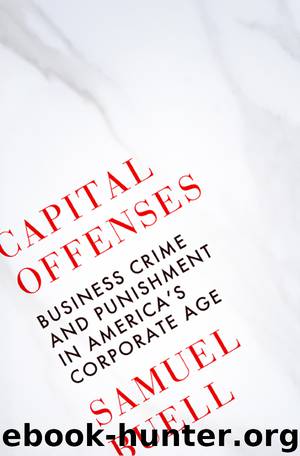Capital Offenses: Business Crime and Punishment in America's Corporate Age by Samuel W. Buell

Author:Samuel W. Buell [Buell, Samuel W.]
Language: eng
Format: epub
Tags: Non-Fiction, Crime & Policing, Business & Economics, Capitalism & Libertarianism, Law & Courts
ISBN: 9780393247831
Google: zvgkjgEACAAJ
Publisher: W.W. Norton
Published: 2016-09-15T04:00:00+00:00
Corporations: We’re Not the Police
LET’S START with the objections of corporations and their lawyers. The argument starts with a complaint about the law. The de jure (on the books) rule for when corporations can be criminally prosecuted in federal court, is said to be far too harsh. Federal law makes a corporation eligible for prosecution anytime any employee violates the law in the course of doing her job and does so, even in part, for the company’s benefit. The rule, which is ancient and used in many other areas of law, is called respondeat superior, or master-servant liability.11
The law doesn’t care if the employee’s violation is minor, the violator holds a low-level job in the company, the company’s managers are in no way involved, the firm’s policies prohibit the conduct, or the employee acted mostly to enrich herself. The idea is to give the “master” lots of good reasons to police his “servant” carefully. When this rule is applied in civil lawsuits, it also gives access to a deeper and better insured pocket for compensating injuries.
In one well-known case, Hilton Hotels was convicted of an antitrust offense when a purchasing manager in Portland, Oregon, in the face of a company directive against such conduct, participated in a cartel agreement to give discounts to favored suppliers. Another notorious example is the conviction of the Sun-Diamond agriculture company for the conduct of the lobbyist who secretly siphoned cash out of the company to help the brother of Mike Espy. The lobbyist’s crime was said to be a fraud in which the company was both victim and, by imputation of its employee’s crime, perpetrator. The Janus-faced theory was that the employee had harmed Sun-Diamond by using its funds to commit a crime, but also that his criminal actions were intended to help curry favor for the firm with the secretary.
This rule for criminal liability of corporations is overbroad, the argument goes, because it sweeps onto the company’s legal ledger every conceivable case of crime on the job. The powerful rule becomes a weapon of prosecutorial mass destruction when combined with two other overbearing features of federal law. First, federal criminal law is stuffed with thousands of overlapping criminal offenses, particularly in areas of business subject to heavy regulation like health care products and securities dealing.12 Second, as we have seen, federal regulatory regimes are replete with rules that can bar companies from doing business in markets or industries if they’re convicted of crimes.
The collective force of these rules leaves corporations without practical ability to contest criminal cases. If a prosecutor comes along with even the notion of a criminal charge, a company has no alternative but to roll over. If the de jure rule makes corporations almost always guilty, then the de facto rule becomes that corporations must always settle with the Justice Department.
Corporations, the argument continues, also do not have the means that individuals enjoy to keep information out of the government’s hands. Ordinary regulatory requirements mandate lots of ongoing, routine disclosure that is not required of private citizens.
Download
This site does not store any files on its server. We only index and link to content provided by other sites. Please contact the content providers to delete copyright contents if any and email us, we'll remove relevant links or contents immediately.
The Social Psychology of Inequality by Unknown(2304)
The Plant Paradox by Dr. Steven R. Gundry M.D(2035)
The Writing on the Wall by Anselm Jappe(1756)
Working for Yourself by J.D. (Nolo) Stephen Fishman(1475)
Every Landlord's Legal Guide by Janet Portman & Stewart Marcia & Ralph Warner(1318)
The First 20 Hours: How to Learn Anything ... Fast by Kaufman Josh(1302)
ADHD on Trial by Michael Gordon(1236)
Decisive by Chip Heath(1195)
Drafting Contracts: How and Why Lawyers Do What They Do, Second Edition by Stark Tina L(1169)
Working for Yourself by Stephen Fishman J.D. (Nolo)(1135)
The Economist Aug 8th 2015 by The Economist(1122)
Restitution by Restitution(1111)
The Economist Aug 29th 2015 by The Economist(1094)
Intellectual Property Strategy by John Palfrey(1079)
The Lord of the Rings: The Fellowship of the Ring, the Two Towers, the Return of the King by J. R. R. Tolkien(1079)
A Practical Guide to International Arbitration in London by Hilary Heilbron(1077)
Collusion by Luke Harding(1042)
Persuasion by Owner(1008)
Chapter 1 by Owner(946)
